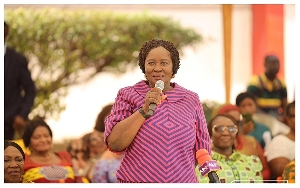Professor Naana Jane Opoku-Agyemang, the Running Mate of the National Democratic Congress (NDC) for Election 2024, has called on traditional leaders to vote in the upcoming December elections.
Prof. Opoku-Agyemang said, “I’ll plead with you, move with us; guide us, so that everything will go well. We all [know] the journey we are embarking on, and we will need the support of everyone.”
She made the appeal when she called on the Tema Traditional Council as part of her Greater Accra campaign tour.
Responding to some land issues raised by the council, she reiterated that former President John Dramani Mahama, the NDC flag bearer, will deliver on his promise to “look into” the concerns of the Tema people to ensure that they benefit from the industries located on their lands.
She said, “As our honourable gentleman, John Dramani Mahama, has said already, he is going to set up a commission to look into it.
"There is a need for us to investigate it because some of the issues we hear about are not pleasant. For lands, some won’t come and add to what we already have; it is what it is.” She added that there was a need to protect lands as they were non-renewable, indicating that the same lands would be handed over to future generations.
On the call for peace, she said it was important that everyone followed the processes and policies put in place, and automatically, the needed peace would be enjoyed by all Ghanaians.
Isaac Ashai Odamtten, the Tema East Member of Parliament and NDC parliamentary candidate for the area, thanked the people of Tema and the traditional leaders for receiving the party’s Running Mate with an open hand.
He urged the women to campaign for the NDC, as it was the party that was aiming to give Ghana its first female Vice President, which would bring hope to girls and women that they could also aspire and reach the apex of politics in the country.
Nii Armarh Soumponu II, the Tema Stool Secretary and Shipi, welcoming the NDC, recalled how their lands were taken from them and called for a return of the lands that were not being used for their intended purpose.
He said that because their farmlands were used for the construction of industries, their people put pressure on them to get them jobs as most of them were now unemployed.
Politics of Thursday, 22 August 2024
Source: GNA

















